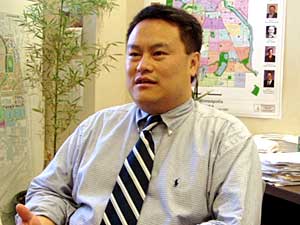|
Audio
Photos
More from MPR
Your Voice
|
Recent violence highlights divisions in Hmong community
April 30, 2004
Federal law enforcement officials are investigating several recent violent incidents involving members of the Twin Cities Hmong community. The most recent event was a suspicious fire that burned down the home of the son of a prominent Hmong leader. While the authorities search for suspects, some in the Hmong community say the recent violence highlights old divisions and wounds that have yet to heal.
St. Paul, Minn. — Most of the victims or intended targets of violence in the last month oppose normalizing trade relations with the communist Laotian government. On the surface, a disagreement over trade policy may hardly seem like a catalyst for violence. But for some Hmong people living in Minnesota, memories of life in Laos are painful, and their opinions of the Laotian government are strong.
"The Vietnam War -- there's still a lot of deep wounds there, and open wounds," said Lee Pao Xiong, the director of the Department of Community Planning and Economic Development for the city of Minneapolis.
Xiong came to the United States as a Hmong refugee in the late '70s. Like many Hmong people, several of his relatives died in the Vietnam war.
 | |||
"You have an element within the population that believes that you should not be dealing with the Lao government -- none whatsoever -- whether that means granting normal trade relations with that country or even sending economic aid to Laos," said Xiong.
During the late '60s and early '70s, about 40,000 Hmong soldiers fought against communist forces in Vietnam and in Laos with the help of the American government. Following the cease fire in Laos in 1975, communists controlled the Laotian government. The Hmong were vilified by the new government as "enemies of the state," and thousands of them fled.
Gen. Vang Pao led the campaign in Laos. According to the U.S. State Department, the general's Hmong soldiers saw some of the fiercest battles of the war. The general and his supporters are the most vocal opponents of the communist Laotian government.
Last Sunday, the general's son's house in Maplewood burned down. Authorities say the cause of the fire is suspicious. And nearly two weeks ago the home of the general's interpreter, Xang Vang, was hit by gunfire.
Vang, who is also a war veteran, blames the violence on agents of the Laotian government whom he says are living here. Vang says the U.S. shouldn't grant normal trade relations, or "NTR," with Laos until it changes its government from a communist dictatorship to democracy.
"The NTR will not benefit any Laotian citizen, either in town or suburb or in the outer rural area," said Vang. "Not at all. It's going to benefit the top leaders, and only the people who plan to attack the United States."
|
[The violence is] just very backward. And if we believe in freedom of speech, freedom of expression, freedom of the press, freedom of religion, and all of that stuff -- this is not the way.
- Lee Pao Xiong |
Vang said there are members of the Laotian government who harbor vengeful thoughts against the U.S. for supporting the war against their country. He said the Hmong people who are still in Laos face continued persecution. Vang said opening trade relations with the government won't help them.
Others disagree with Vang's assessment. Dr. Yang Dao is a former Laotian senator.
"The NTR will give new opportunity for the Laotian people, including the Hmong, to export agricultural products and artifacts to the United States," Dao said.
Dao also said he doesn't believe there are Laotian government agents in Minnesota trying to disrupt the anti-NTR movement.
There are other divisions in the Hmong community that may be playing a role in this dispute.
There are about 21 Hmong clans, or family groups, in Minnesota, some of which are engaged in ongoing disputes. Yang Dao, Xang Vang and Lee Pao Xiong say they doubt clan disputes are behind the violence. However, most of the targets of recent violent incidents have been of the Vang clan. Xiong said it could be less of a clan feud as some kind of more personal dispute.
Xiong said there's also a generational divide that has been highlighted lately. He said there are younger Hmong who are ready to let the past be the past, and go forward with normalized trade relations. Older refugees are less likely to forget what drove them from their homeland.
Xiong said the most important thing for the community now is to get clan leaders and elders out to call for an end to the violence.
"It's [the violence is] just very backward," said Xiong. "And if we believe in freedom of speech, freedom of expression, freedom of the press, freedom of religion, and all of that stuff -- this is not the way."
Federal law enforcement authorities say they are still investigating the recent violent incidents. Lee Pao Xiong and others say they hope the perpetrators are found quickly, so the community can mend its differences and tend to those still suffering from the war.
|
News Headlines
|
Related Subjects
|

